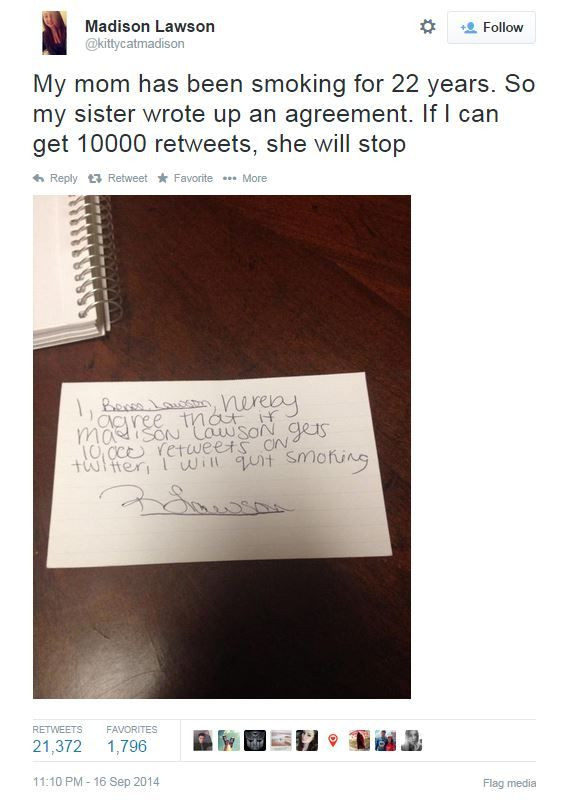Twitter Pact Helped 22-Year Smoker Finally Quit After Daughter Earned 10K Retweets

Smoking steals years from lives, so Madison Lawson and her sister got together to write up a contract to persuade her mother to stop her 22-year-old habit. On Sept. 16., the signed contract uploaded onto Madison’s account read: "I, Renee Lawson, hereby agree that if Madison Lawson gets 10,000 retweets on Twitter, I will quit smoking.” Within 24 hours, Madison’s tweet had spread like wildfire across the Twittersphere and earned her 14,000 reposts.

"My mom has been smoking for 22 years. So my sister wrote up an agreement. If I can get 10,000 retweets, she will stop," Madison’s tweet read. After far surpassing her goal, the figure kept soaring and now stands at more than 21,000 and has been favorited by over 1,700 Twitter users. By Sept. 18., Madison confirmed with her follows and Internet support system that her mother had agreed to quit her cigarette smoking habit once she finishes the few packs she has left.
How hard will it be for the Tennessee mom to quit such a long-standing and addictive habit? Most ex-smokers claim quitting is the hardest thing they ever did, and despite the successful number of millions who have quit, there are also those who have failed. Approximately 80 to 90 percent of regular smokers, such as Madison’s mom, are addicted to nicotine, according to the U.S. Department of Health and Human Services Smoke Free. Nicotine is a toxic, colorless drug of yellowish oily liquid and the main active ingredient in tobacco products. It’s what chemically affects and alters the body and brain, which is how over time a physical dependence builds and overcomes the smoker.
Just like any other long-term drug use, there are withdrawal symptoms. It’ll be different for every smoker, but the most common symptoms include feeling down or sad, having trouble sleeping, irritability, on edge, having difficulty thinking clearly and concentrating, feeling restless and jumpy, increase of appetite and weight gain. The withdrawal symptoms aren’t typically dangerous, but it can be especially important to become hyperaware of the sad lows of quitting if you’re prone to depression.
Nicotine gum, the patch, inhaler, spray, and lozenges are all known as nicotine replacement therapies and are useful tools to help lessen the burden of oppressive withdrawal symptoms by providing small increments of nicotine to wane off. If none of those work, a hopeful quitter could always turn to bupropion SR pills, and although those require a prescription, they will decrease smoking urges with side effects, including dry mouth and difficulty sleeping. Varenicline pills are another prescription pill option that also don’t contain any nicotine but go the extra mile of blocking the effects of nicotine from cigarettes if you ever decide to smoke again.



























